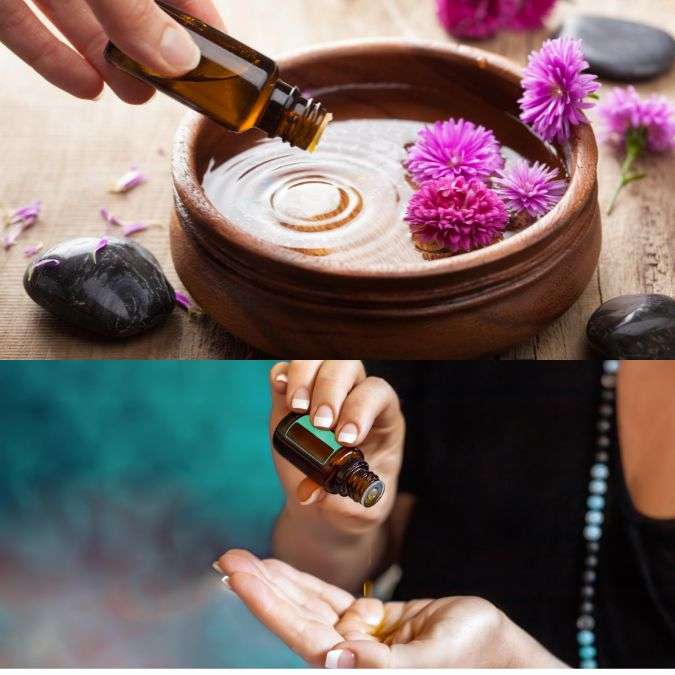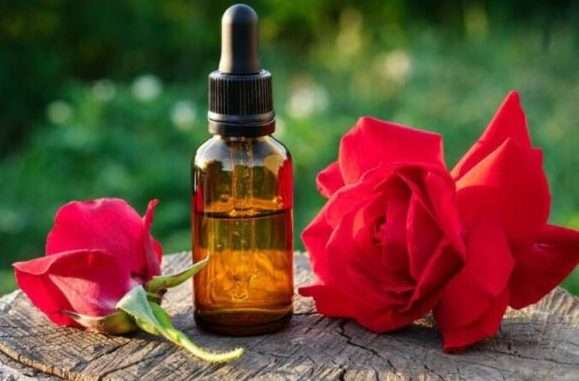Would you like to know if there is anything natural that will not cause your skin to be allergic to? They are Essential oils. One such essential oil is Rose Essential Oil. It is derived from the petals of the Rose flower and it has been used for centuries in various cultures for its potential benefits for the skin.
It has many benefits and is also easily available in the market, so you don’t have to struggle searching for it. Do you wanna know its tremendous benefits?? Then Keep reading as this article may motivate you to make use of this highly beneficial oil every day.
Table of Contents
Below are 7 Benefits of Rose Essential Oil
1. Moisturizes your skin
2. Anti-Aging
3. Reduces Redness and Inflammation
4. Controls Acne
5. Reduces scars
6. Reduces Pigmentation
7. Work as aroma therapy
So. let us dive deep into its benefits now.
Benefits of Using Rose Essential Oil For Skin
1. Moisturising Skin
Rose essential oil is known for its hydrating properties. If you have dry skin or dehydrated skin, apply rose essential oil to your body and you will see the difference. It locks moisture into the skin, making it an effective addition to any skincare regimen.
We all know that Fatty acids play a vital role in moisturizing. It has nourishing fatty acids, and hence it is the main ingredient in most moisturizers. For Better absorption, apply it at bedtime before sleeping.
2. Anti-aging
Rose oil is rich in antioxidants, that help protect the skin from free radical damage. This, in turn, may help reduce the appearance of fine lines and wrinkles, promoting a more youthful complexion. So if you want younger-looking skin then do not forget to keep this amazing oil in stock in your wardrobe.
3. Reducing Redness and Inflammation
Sometimes we get irritated or red skin due to sun exposure or allergy. In that case, you can apply some Rose essential oil over there as it has anti-inflammatory properties, making it useful for soothing irritated or red skin. It may be beneficial for individuals with conditions like rosacea or sensitive skin.
4. Acne Control
Many people suffer from Acne. The antimicrobial properties of rose oil can help combat acne-causing bacteria. It may be used in diluted form as a spot treatment or added to skincare products designed for acne-prone skin.
There was a study published in 2010 that proved that oil distilled from roses contains a wide spectrum of antibacterial properties against pathogens that cause infections. These properties help to cleanse and tone the skin while preventing the formation of acne.
5. Scar Fading
Rose oil is sometimes used to reduce scars, including surgical scars and stretch marks. Its regenerative properties may support the skin’s healing process. Rose oil is a rich source of skin-boosting vitamins and minerals that help to prevent oxidative damage. Its natural trans-retinoic acid is effective in fading fine lines and wrinkles.
6. Skin Tone Evening
Are you suffering from hyperpigmentation or uneven skin tone? Then you want to apply Rose oil as it contributes to a more even skin tone and reduced pigmentation, making it potentially helpful for individuals with hyperpigmentation or uneven skin tone.
7. Relaxation
There is a soothing aroma that may relieve stress and promote relaxation when diffused with rose essential oil. Stress reduction can indirectly benefit the skin by minimizing stress-related skin issues. There are different Aromatherapy techniques available that include this oil.
How to use Rose Essential Oil for Skin Whitening?

Rose essential oil is known for its many benefits for the skin, including its potential to improve skin tone and complexion. Despite its inability to directly “whiten” the skin, it can help promote an even and radiant complexion. Here are some tips:
- Dilution
Essential oils are highly concentrated and can be irritating to the skin if used undiluted. Always dilute rose essential oil before applying it to your skin. A common dilution ratio is about 1-2 drops of rose essential oil per 1 tablespoon of carrier oil. Suitable carrier oils include jojoba oil, sweet almond oil, coconut oil, or argan oil.
2. Patch Test
Before applying rose essential oil to your face, perform a patch test. Apply a small diluted amount to a discreet area of your skin, like the inner wrist or elbow. Wait for any side effects such as redness, itching, or irritation.
3. Facial Massage
One way to use rose essential oil is to add a few drops to your regular facial moisturizer or serum. Mix well and apply it to your face and neck as part of your daily skincare routine. Gently massage it into your skin using upward, circular motions.
4. Aromatherapy
You can also benefit from rose essential oil by adding a few drops to a bowl of hot water and inhaling the steam. This can help relax you and promote a sense of well-being, which indirectly contributes to better skin health.
5. DIY Face Masks
You can incorporate rose essential oil into homemade face masks. Here’s a simple recipe:
– Mix 1-2 drops of rose essential oil with 1-2 tablespoons of yogurt or honey.
– Apply the mask to your clean face and leave it on for about 15-20 minutes.
– Rinse off with warm water and pat your skin dry.
6. Rose Water Toner
You can make your rose water toner by mixing a few drops of rose essential oil with distilled water. Use a spray bottle to apply it to your face after cleansing. This can help refresh and hydrate your skin.
7. Avoid Sun Exposure
Rose essential oil does not offer sun protection. To maintain the benefits of your skincare routine and prevent skin damage, be sure to use sunscreen when going outdoors.
8. Consistency
Results from natural remedies like rose essential oil may take time to show. Be consistent with your skincare routine, and don’t expect instant results.
8. Quality Matters
There are many brands available in the market. Choose high-quality, pure rose essential oil from reputable brands to ensure you get the best results.
TAKEOUT
Rose Essential Oil has tremendous benefits for the skin. It is a wise idea to keep in stock to get glowing younger younger-looking skin. Remember that individual skin reactions can vary, so what works for one person may not work for another. If you experience any adverse reactions or discomfort, discontinue use and seek medical advice if necessary.
If you have found this article helpful, tell your family and friends about it.
Share it on social media, or leave a comment.
ALSO SEE:
7 INGREDIENTS TO AVOID IN SKINCARE PRODUCTS
